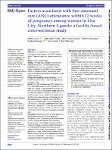Factors associated with first antenatal care (ANC) attendance within 12 weeks of pregnancy among women in Lira City, Northern Uganda: a facility-based cross- sectional study

View/
Date
2023Author
Acup, Walter
Opollo, Marc Sam
Akullo, Betty Nancy
Musinguzi, Marvin
Kigongo, Eustes
Opio, Bosco
Kabunga, Amir
Metadata
Show full item recordAbstract
Objective This study aimed at assessing factors
associated with first antenatal care (ANC) attendance
within 12 weeks of pregnancy among women in Lira
City.
Design A cross-sectional study.
Settings The study was conducted in health facilities
offering ANC services in Lira City, Northern Uganda.
Participants The study was among 368 pregnant
mothers attending their first ANC in the three selected
facilities (Lira Regional Referral Hospital, Ober Health
Center IV and Pentecostal Assembly of God Mission Health
Center IV) in Lira City.
Primary and secondary outcome measures Level of
first ANC attendance within 12 weeks of pregnancy and
associated factors.
Results Early ANC attendance was 36.1%. Women who
were: unmarried (adjusted OR (aOR): 0.40, 95% CI: 0.16 to
0.99), took >2 hours to reach a health facility (aOR: 0.21,
95% CI: 0.07 to 0.62), or not visited by village health teams
or healthcare workers at home (aOR: 0.33, 95% CI: 0.12
to 0.92) were less likely to attend their first ANC early. On
the other hand, women who were: not knowing first that
ANC guides parents on infant care (aOR: 2.22, 95% CI:
1.06 to 4.67); pregnant without consent of spouse (aOR:
4.29, 95% CI: 1.75 to 10.55); attending ANC from a private
facility (aOR: 2.89, 95% CI: 1.27 to 6.15); and having two
to three healthcare workers present at the ANC clinic (aOR:
1.79, 95% CI: 1.03 to 3.13) were more likely to attend ANC
early.
Conclusions Despite the fact that the WHO recommends
that all women begin ANC within 12 weeks after
conception, Lira City in Northern Uganda had a low overall
incidence of timely ANC initiation. Being unmarried,
distance to reach a health facility, and being visited by
village health teams or healthcare workers at home were
all linked to timely ANC commencement. As a result,
intervention efforts should concentrate on the highlighted
determinants in order to promote ANC initiation in Lira City,
Northern Uganda. This can be accomplished by providing
information and education to the community on the timing
and necessity of ANC in Northern Uganda.
Collections
- Research Articles [19]
